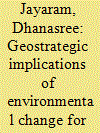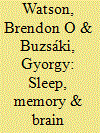| Srl | Item |
| 1 |
ID:
119128


|
|
|
| 2 |
ID:
074870


|
|
|
|
|
| Publication |
Amsterdam, IOS Press, 2006.
|
| Description |
xvi, 141p.
|
| Series |
NATO Security Through Science Series Vol. 7
|
| Standard Number |
1586035932
|
|
|
|
|
|
|
|
|
|
|
|
Copies: C:1/I:0,R:0,Q:0
Circulation
| Accession# | Call# | Current Location | Status | Policy | Location |
| 051895 | 327.17/SHA 051895 | Main | On Shelf | General | |
|
|
|
|
| 3 |
ID:
137672


|
|
|
|
|
| Summary/Abstract |
Sleep occupies roughly one-third of our lives, yet the scientific community is still not entirely clear on its purpose or function. Existing data point most strongly to its role in memory and homeostasis: that sleep helps maintain basic brain functioning via a homeostatic mechanism that loosens connections between overworked synapses, and that sleep helps consolidate and re-form important memories. In this review, we will summarize these theories, but also focus on substantial new information regarding the relation of electrical brain rhythms to sleep. In particular, while REM sleep may contribute to the homeostatic weakening of overactive synapses, a prominent and transient oscillatory rhythm called “sharp-wave ripple” seems to allow for consolidation of behaviorally relevant memories across many structures of the brain. We propose that a theory of sleep involving the division of labor between two states of sleep–REM and non-REM, the latter of which has an abundance of ripple electrical activity–might allow for a fusion of the two main sleep theories. This theory then postulates that sleep performs a combination of consolidation and homeostasis that promotes optimal knowledge retention as well as optimal waking brain function.
|
|
|
|
|
|
|
|
|
|
|
|
|
|
|
|
| 4 |
ID:
129326


|
|
|